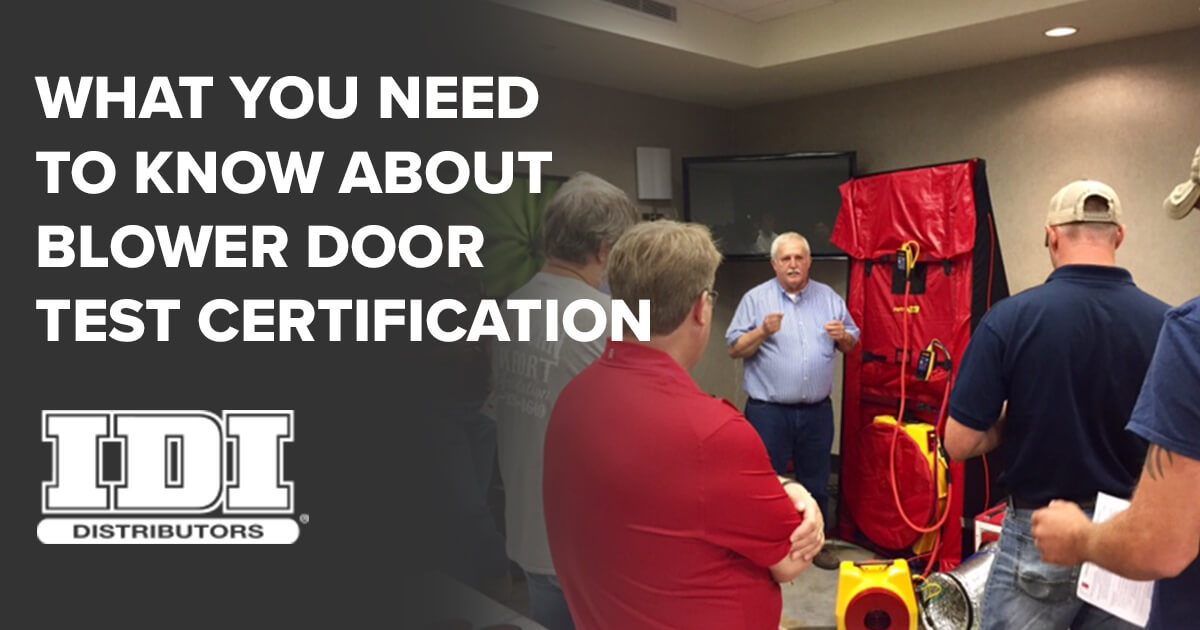Did you know that most utility programs and the majority of state codes now require testing the air leakage of a home? As a contractor, looking for new ways to increase your bottom line and maintain a competitive edge in the industry is always a priority. Becoming certified as a blower door test contractor can open a new opportunity for your business. Some states even allow contractors to test their own work.
In the past, blower door testing was limited to custom homes, but that is no longer true. Hundreds of thousands of homes are tested each year, and with this widespread acceptance comes the need for more professionals with a blower door certification.
Until recently, there were no requirements to be certified to run a blower door test, but that is changing fairly quickly. GA, FL, NJ, CA, NY, MI, CO, AL, and several other states are now requiring some form of credential in their jurisdiction. Keep reading to learn more about how IDI can help you get certified and the benefits it can bring to your business.

What Is the Blower Door Certification and Who Can Perform the Test?
The answer to this depends on the code official or AHJ (Authority Having Jurisdiction). While most municipalities will accept blower door test certifications from any HERS Rater or BPI-Building Analyst, others only require an IDL (Infiltration Duct Leakage certification through BPI) or DET (Duct & Envelope Tightness certification through RESNET).
So, which one is right for you? My first choice is the IDL. Don’t get me wrong, I am a big fan of being a HERS Rater or Building Analyst, but your AHJ may still want a separate certification for blower doors. Almost everywhere that calls out for a DET certification will allow an IDL, but not all AHJs requiring an IDL will allow a DET in its place.
The difference is that the DET is a “one and done” blower door certification. There is no continuing education requirement and no governing body to take a DET certification away from someone who does not test ethically or properly. The IDL offers both of these and requires the holder to retest and verify their skills every 3 years in order to keep their certification. I’m sure you can see how those differences are very appealing to any AHJ or official.
Why Get Certified?
In terms of comfort, building envelopes are a big deal. In fact, without air-sealing a structure, you are essentially trying to heat and cool it with the door open. I once heard Joe Medosch from Retrotec say, “The building envelope is the largest duct system, and until your state requires testing, your envelope is out of control.” And I have to say, I completely agree with Joe. How hard is it to drink from a straw with holes in it?
I believe that very soon, every home or building will be tested in your area. Now ask yourself, who will be doing that testing — you … or your competitor?
Earning certifications and staying up to date on codes and products that are industry related is imperative to the success of your business. IDI offers several certification and safety training options throughout the year, including the opportunity for contractors to become blower door certified in correlation with the updates that states will be facing on their current residential energy codes.
Blower door testing certification, or Infiltration and Duct Leakage certification through IDI and the Building Performance Institute (BPI), is a comprehensive way to not only learn a new product that is in high demand, but to ensure that you are on top of the best practices to push your sales forward. Earning an IDL certification is a cost-effective way for contractors to gain the skills needed to offer duct leakage and blower door field tests, in compliance with IECC codes. This will allow you to have even more skills that contractors, homeowners, and building code officials will find very valuable.
is a comprehensive way to not only learn a new product that is in high demand, but to ensure that you are on top of the best practices to push your sales forward. Earning an IDL certification is a cost-effective way for contractors to gain the skills needed to offer duct leakage and blower door field tests, in compliance with IECC codes. This will allow you to have even more skills that contractors, homeowners, and building code officials will find very valuable.
How To Get Certified
IDI partners with BPI to host IDL blower door certification classes and other courses for professional certifications. In 2018 we have had several events already, but there are still a few upcoming Infiltration and Duct Leakage Certification Courses available:
- August – Tampa, FL and Chanhassen, MN
- Don’t see one near you? Contact your local IDI sales rep to request one!
Each IDL course is 2 days, and consists of 1 classroom day to prepare for the field exam on the second day. This task-oriented certification verifies that you can conduct duct leakage tests according to the ASTM E1554-07 standard and blower door tests to ASTM E779 standard.
For more information on the blower door testing check out this blog post from The Insulation Institute.
At IDI, our goal is to consistently provide you with the best products and information for your company. Your success is our success – which is why we are dedicated to providing our customers with continuing education options like the IDL certification course. Click here for upcoming dates and a full list of our training opportunities.